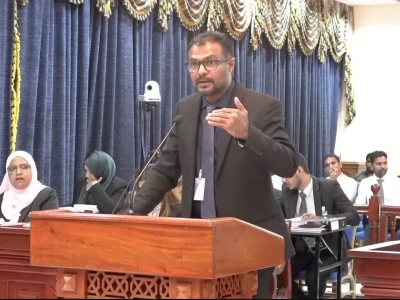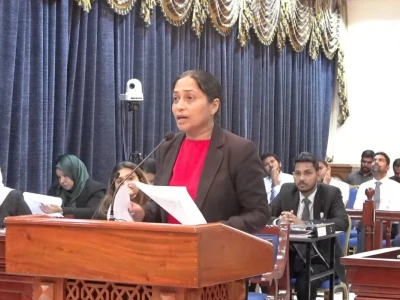
PPM-PNC seeks to continue Nasheed motion in Eva's absence
Justice Husnu Al Suood questioned about what will happen if the parliament does not comply with the order issued by the Supreme Court.
By
Fathmath Ahmed Shareef
The PPM-PNC has also asked the Supreme Court to declare that an ordinary MP can take the chair to deal with a no-confidence motion against speaker Mohamed Nasheed in the absence of deputy speaker Eva Abdulla.
The first hearing of the constitutional petition filed by the MDP seeking an order that no other sitting of the parliament can be held without a decision on the no-confidence motion against speaker Mohamed Nasheed.
The Democrats, to which Nasheed belongs, as well as the PPM-PNC, which will be taking over the government on November 17, have also intervened into the case.
Former Attorney General Azima Shukoor represented the PPM-PNC.
PPM-PNC requested:
-
In the event of a no-confidence motion against speaker Nasheed, to move away from the procedure laid down in Article 205 of the rules of procedure of the parliament that the deputy speaker should preside over the sitting, and go back to article 44 of the rules of procedure, which states how to proceed in the event both the speaker and the deputy speaker are absent, and to decide that the no-confidence motion against Nasheed can proceed; this is an echo of the order requested by MDP who filed the case at court
-
To declare that the ordinary sittings of parliament cannot be stayed by the motion of no-confidence as the circumstances do not exist that there will be no further proceedings in connection with the motion of no confidence; The MDP has asked the court to rule that nothing further can be done without pursuing the motion against Nasheed
"Those entrusted with the responsibility of carrying out any power of the state without stopping within the constitutional framework in this case, should be issued an order to discharge their duties," Azima said.
The bench responded asking whether the Supreme Court could issue an order against the people like that, what the arguments were and whether the privileges of the parliament could not be infringed upon by issuing such an order.
Azima said the Supreme Court can issue an order and it is not an invasion of parliamentary privileges. She said:
-
The Supreme Court is the highest body for interpreting the constitution
-
Under the constitution, parliament is the legislative power; It operates independently of other powers of the state within the constitutional framework
Reacting to these comments, Justice Husnu Al Suood said that some argue that a review of the trial comes with a detailed judgment and that only detailed judgments can be made by the Supreme Court in such constitutional matters, including the detailed judgment and the judgment of acting in a particular manner.
Therefore, he raised the question “what will happen if the parliament does not comply with the order issued by the Supreme Court".
In response, Azima said she believed that no action could be taken within the administrative structure of the state without judicial review. The constitutional framework of Maldives is designed to be open to judicial review, she said.
Related
Related

MDP wants to table Nasheed motion for Muizzu inauguration

Parliament SG offers 4 solutions to Nasheed motion deadlock

Muizzu inauguration can proceed despite deadlock, state tells SC

